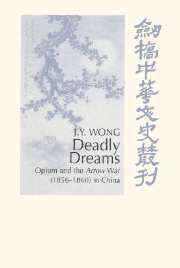Book contents
- Frontmatter
- Contents
- List of Tables
- List of Figures
- Poem by the late Mr Qin Esheng
- Foreword by Professor Wang Gungwu
- Foreword by Professor C. A. Bayly
- Preface
- Part I The confusion of imperialism
- Part II The pretext for imperialism
- Part III The personalities of imperialism
- 3 Harry Parkes: ‘If you would read a little international law.’ – Punch.
- 4 Sir John Bowring: Possessed by a monomania
- 5 Commissioner Yeh: A ‘monster’?
- 6 Rule Britannia and vox populi, vox Dei
- Part IV The rhetoric of imperialism
- Part V The mechanics of imperialism
- Part VI The economics of imperialism
- Part VII The dynamics of imperialism
- Chronology of major events
- Word list
- Abbreviations
- Bibliography
- Index
6 - Rule Britannia and vox populi, vox Dei
Published online by Cambridge University Press: 29 September 2009
- Frontmatter
- Contents
- List of Tables
- List of Figures
- Poem by the late Mr Qin Esheng
- Foreword by Professor Wang Gungwu
- Foreword by Professor C. A. Bayly
- Preface
- Part I The confusion of imperialism
- Part II The pretext for imperialism
- Part III The personalities of imperialism
- 3 Harry Parkes: ‘If you would read a little international law.’ – Punch.
- 4 Sir John Bowring: Possessed by a monomania
- 5 Commissioner Yeh: A ‘monster’?
- 6 Rule Britannia and vox populi, vox Dei
- Part IV The rhetoric of imperialism
- Part V The mechanics of imperialism
- Part VI The economics of imperialism
- Part VII The dynamics of imperialism
- Chronology of major events
- Word list
- Abbreviations
- Bibliography
- Index
Summary
I. Introduction
We have seen how determined Bo wring was to force the gates of Canton, and why Yeh was equally determined to deny him satisfaction despite the rapid escalation of hostilities. Yeh's determination was based on the opposition displayed by the Cantonese to Britons entering their city. In this chapter, I attempt to explain this opposition and to establish whether it formed part of the origins of the Arrow War. After all, the British government claimed it did and for that purpose had all pertinent correspondence assembled, printed, and distributed to the members of Parliament for debate.
John Nolde has made a special study of the Cantonese people of this time, including their behaviour and attitudes. He concludes that their opposition was due to xenophobia. He adopts the definition of xenophobia, offered by the Oxford Dictionary, as a ‘morbid dread or dislike of foreigners’. Furthermore, he makes a distinction between the ‘popular xenophobia’ exhibited by the masses and ‘official xenophobia’ as a government policy. These manifestations will be examined in turn.
II. Popular xenophobia or protonationalism?
Nolde thinks that long before the Opium War ‘a spirit of bitter anti-foreign feeling had lurked in the hearts of most Cantonese and that for a European to live among them was to live dangerously’.
Nolde cites as evidence the views of authors like H. B. Morse, but does not show how they came to their conclusions.
- Type
- Chapter
- Information
- Deadly DreamsOpium and the Arrow War (1856–1860) in China, pp. 128 - 150Publisher: Cambridge University PressPrint publication year: 1998



